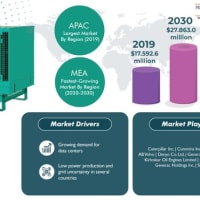
As people are increasingly getting aware regarding the adverse effects of excessive utilization of fossil fuels for energy generation on the environment, the demand for renewable energy sources is increasing rapidly. Owing to this, the adoption of solar energy has increased considerably across the globe. Solar energy is one of the cleanest sources of energy, and its increased usage can aid in reducing carbon dioxide emissions significantly. Governments of various countries are also taking initiatives for increasing the adoption of renewable energy sources for curbing the surging levels of pollutions. All these factors are leading to the increasing demand for ultra-thin solar cells.
According to a study conducted by P&S Intelligence, the global ultra-thin solar cells market attained a value of $30.0 million in 2019 and is predicted to exhibit a 56.9% CAGR during the forecast period (2020–2030). These solar cells are of three types when it comes to technology, namely gallium arsenide, copper Indium gallium diselenide, and cadmium telluride (CdTe). Since CdTe technology provides efficiency both in terms of power generation and cost, their demand has been the highest up till now.
Get the detailed market insights: https://www.psmarketresearch.com/market-analysis/ultra-thin-solar-cells-market/report-sample

Off-grid cells, however, can only work on energy that is produced from the sunlight. The major applications of ultra-thin solar cells are aerospace, automotive, and building-mounted, among which, the highest demand for these cells was created for the building-mounted application in the past. This is due to the fact that these energy producing devices are extensively being deployed on commercial and residential units across the globe. Moreover, ultra-thin photovoltaic (PV) cells are widely suited for roofs, as they cannot bear much load, thereby leading to their increasing installation on buildings.
Geographically, the ultra-thin solar cells market is being dominated by the Asia-Pacific region at the present time, and the demand for these devices is further expected to be the highest in this region in the near future as well. This is because, PV panel manufacturers in the region are increasingly engaging in research & development activities for improving the efficiency and decreasing the cost of these devices, without losing the profit margin. Such efforts are leading to the development of ultra-thin solar PV cells and the automotive industry in the region has already started making use of these devices.
Hence, the demand for ultra-thin solar cells is growing due the rising dependence on solar energy and technological advancements.
According to a study conducted by P&S Intelligence, the global ultra-thin solar cells market attained a value of $30.0 million in 2019 and is predicted to exhibit a 56.9% CAGR during the forecast period (2020–2030). These solar cells are of three types when it comes to technology, namely gallium arsenide, copper Indium gallium diselenide, and cadmium telluride (CdTe). Since CdTe technology provides efficiency both in terms of power generation and cost, their demand has been the highest up till now.
Get the detailed market insights: https://www.psmarketresearch.com/market-analysis/ultra-thin-solar-cells-market/report-sample

Off-grid cells, however, can only work on energy that is produced from the sunlight. The major applications of ultra-thin solar cells are aerospace, automotive, and building-mounted, among which, the highest demand for these cells was created for the building-mounted application in the past. This is due to the fact that these energy producing devices are extensively being deployed on commercial and residential units across the globe. Moreover, ultra-thin photovoltaic (PV) cells are widely suited for roofs, as they cannot bear much load, thereby leading to their increasing installation on buildings.
Geographically, the ultra-thin solar cells market is being dominated by the Asia-Pacific region at the present time, and the demand for these devices is further expected to be the highest in this region in the near future as well. This is because, PV panel manufacturers in the region are increasingly engaging in research & development activities for improving the efficiency and decreasing the cost of these devices, without losing the profit margin. Such efforts are leading to the development of ultra-thin solar PV cells and the automotive industry in the region has already started making use of these devices.
Hence, the demand for ultra-thin solar cells is growing due the rising dependence on solar energy and technological advancements.




















※コメント投稿者のブログIDはブログ作成者のみに通知されます